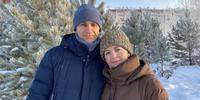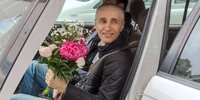Case of Kolesnichenko in Seversk
Filter
- #
At the same time, at about 9 a.m., officers of the Investigative Committee and the FSB invaded the homes of Sergey Belousov, Andrey Kolesnichenko, Andrey Ledyaykin, Alexei Ershov and Yevgeny Korotun. 50-year-old Kolesnichenko and 31-year-old Ledyaikin are detained by FSB officers at work, after which searches are conducted at their homes. The search of 67-year-old Aleksey Ershov lasts about 5 hours. His wife is not allowed into the apartment, but later taken for interrogation with her husband and daughter.
One of the believers later said: "We opened the door because it was almost broken down. About 10 people entered the apartment and began to search. My son and I were kept in a stairwell for several hours. The neighbors took out a chair and some food." Lieutenant Sergey Mamontov, senior investigator of the investigation department for the Leninsky district of Tomsk, asks Kolesnichenko why he "does not attend the Orthodox or Catholic Church."
Law enforcement officers confiscate electronic devices, various editions of the Bible, notebooks, Wi-Fi routers, video cameras, photos, postcards, bank cards, foreign passports and even volumes of Victor Hugo and Leo Tolstoy from believers.
- #
The Investigation Department for the Closed Administrative Territory of Seversk of the Investigative Committee of the Investigative Committee of the Russian Federation for the Tomsk Region is initiating a criminal case under Part 2 of Article 282.2 of the Criminal Code against 51-year-old Andrey Kolesnichenko. The case was separated into a separate proceeding from the materials of the case of Yevgeny Korotun. The believer is suspected of "committing a crime under Part 2 of Article 282.2 of the Criminal Code of the Russian Federation - participation in the activities of an extremist organization."
- #
The investigator refuses to terminate the criminal case against Andrey Kolesnichenko because "the guilt of committing a crime under Part 2 of Article 282.2 of the Criminal Code of the Russian Federation is confirmed by the totality of the evidence collected in the criminal case." However, the investigator attaches documents that the believer cites as evidence of his innocence.
- #
Andriy Kolesnichenko receives an indictment stating that he "took part in a closed secret meeting in the form of a collective religious service, consisting of the playback of audio and video recordings ... sequential singing of songs from a special collection of religious teachings of Jehovah's Witnesses and prayers to Jehovah God."
The accusation is based on the decision of the Supreme Court of the Russian Federation of 20.04.2017, the testimony of the witness Klisheva, as well as on the secret operational-search activities "Observation".
- #
Case No. 12102690003000020 is submitted to the Seversky City Court of the Tomsk Region. The first hearing is scheduled for July 7, 2021.
- #
About 15 listeners come to the first court hearing on the merits. The bailiffs let only four of them into the hall.
The prosecutor reads out the accusation and excerpts from the case file on the role of Andrey Kolesnichenko in peaceful worship: "offered to sing the song "Encourage each other", "there was communication with the members of the group on the topic of Jehovah", "offered to pray". Among other things, the prosecutor accuses the believer of calling for "service to Jehovah."
The defendant announces his attitude towards him, rejecting the assumption that he committed a crime of extremist or any other nature. The believer declares: "There is not a single victim and not a single victim in my case. Can a far-fetched or imagined threat be the basis for my accusation? Hatred and incitement to religious hatred are alien to me. It pains me to see how people suffer, and I am accused of wishing them harm, destroying families, urging them to refuse medical intervention and calling people Satanists. Such a description is the exact opposite of who I really am... Even Jesus Christ was accused of "calling the people to rebellion, forbidding Caesar to pay taxes," and Paul was said to be "worse than any contagion, the instigator of rebellions among the Jews throughout the land, and the leader of the sect of the Nazarenes." I believe that you need to be very careful when accusing believers of extremism."
- #
22 people come to the courthouse to support the believer. They do not enter the courtroom due to the high alert regime introduced in the region in connection with the COVID-19 pandemic.
- #
Prosecution witness K. E. Klisheva is being questioned. Judge Yalchin Badalov explains to the believer the nuances of interrogating a witness, explains how to ask questions correctly, suggests taking his time and allows him to ask the witness as many questions as Kolesnichenko sees fit.
Answering the defendant's questions, K.E. Klisheva explains that the materials that were discussed during the liturgical meetings did not encourage anything bad, they were "useful and good."
- #
The lawyer sets out the position of the defense, reading excerpts from the decisions of the courts in the cases of Jehovah's Witnesses, in particular the European Court of Human Rights, as well as the opinions of experts, which boil down to the fact that the religious practices of Jehovah's Witnesses do not pose a threat to public or state security.
- #
Video recordings of liturgical meetings are examined. The judge asks to show only those video fragments of meetings in which the defendant directly participated. At the same time, while watching the video, both the judge and the prosecutor go about their business without delving into the essence of the recordings.
- #
In the Seversky City Court, the debate of the parties begins. The prosecutor requests a sentence of 5 years in a general regime colony and 1 year of restrictions for Kolesnichenko.
- #
About 20 people come to the courthouse to support Andriy Kolisnichenko. Only the defendant's wife and son are allowed to attend the hearing.
The court granted the request for video filming during the announcement of the verdict, which is expected on January 19.
Speaking in the debate, Kolesnichenko draws attention to the decision of the Plenum of the Supreme Court of the Russian Federation of 28.06.2011 (as amended on 28.10.2021): "The prosecution in this criminal case made its own portrait of an "extremist", ignoring the fact that to be or not to be a believer, to celebrate holidays or not to celebrate them, to transfuse blood or not, is, firstly, a right, and not an obligation of a citizen, and, secondly, does not constitute an offence."
Then Kolesnichenko asks questions: "If the Constitution of the Russian Federation allows me to be a believer, if the Supreme Court of the Russian Federation has not banned the religion of Jehovah's Witnesses, if the Government of the Russian Federation publicly declares that believers in Russia have the right to practice the religion of Jehovah's Witnesses after April 20, 2017, and even if the President of the Russian Federation does not understand why Jehovah's Witnesses are being persecuted, then was I obliged to understand my religious rights in any other way, enshrined in Article 28 of the Constitution of the Russian Federation? Then why do they ascribe criminal motives to me? Thus, this criminal case is absolutely unpredictable and illogical for me, given that I did not commit anything criminal or unusual."
- #
The last word of the defendant Andrey Kolesnichenko in Seversk - #
Judge Yalchin Badalov sentences Andrey Kolesnichenko to 4 years in a general regime colony with additional restrictions for a period of 1 year (after serving the term, a believer during this period will not be able to visit places of mass, sports, cultural and entertainment events and participate in them, change his place of residence and leave it at night).
- #
It turns out that Andrey Kolesnichenko is being held in pre-trial detention center No. 1 in Tomsk. Letters of support can be sent by both regular mail and e-mail.
- #
It becomes known about the transfer of Andrey Kolesnichenko to pre-trial detention center No. 2 in the city of Kolpashevo, which is 270 kilometers from Tomsk, in connection with repairs in pre-trial detention center No. 1 in the city of Tomsk.
- #
Kolesnichenko states that to date he has not been provided with an audio recording of the court session of the Seversky City Court, although he filed a petition to this effect immediately after the verdict. In this regard, the Tomsk Regional Court adjourns the hearing and decides to acquaint the believer with the audio recording of the court session.
- #
The panel of judges of the Tomsk Regional Court, chaired by Andrey Kaplyuk, appoints Andrey Kolesnichenko 4 years of suspended sentence instead of real imprisonment.

